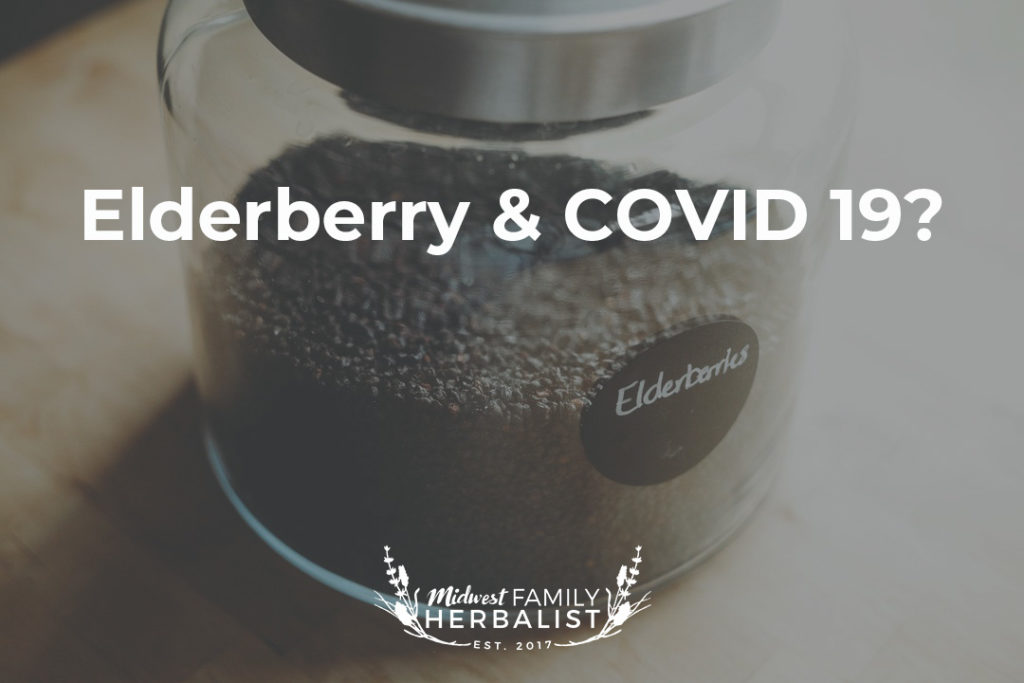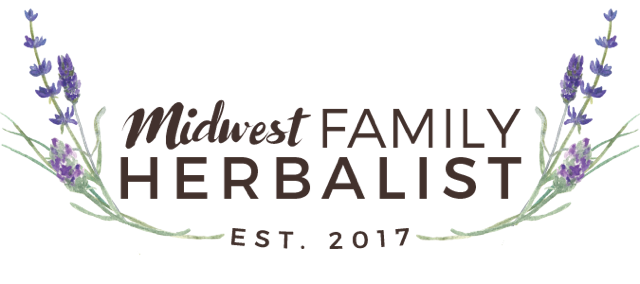14 Mar Elderberry and COVID 19: Another Herbalist Weighs In

*Please note: the Elder species we are referring to in this article is European Black Elderberry Sambucus Nigra L. This is the most widely researched variety, along with the most commonly used variety in todays Elderberry Syrup and other Elderberry preparations. Please also note: I do not pretend to be an expert on this, so I will amend this article at any time that new information presents itself to me. Please feel free to share any studies, etc, with me. I am always here to learn!
With the rise in love for Elderberry Syrup and other Elderberry products, it’s no surprise the question arose about its use with the new Corona virus {COVID 19}. This question has sparked a split amongst people, and herbalists, with one side saying, “yes! It is an immune modulator, and has properties that will be effective against this viral strain” while the other side says, “No! Elderberry raises cytokines, which happens to be the same cytokines COVID 19 raises, therefore leaving you susceptible for a cytokine storm!” So what do the facts say? Let’s get into it!
Let’s start first with what the concerns of the “don’t use” camp are:
Concern #1: Elderberry raises cytokine production in the body A 2001 study on a standardized elderberry product, called Sambucol, demonstrated that Elderberry raises cytokine production in the body. IL-1 beta, TNF-alpha, IL-6, IL-8 were the ones most notably raised in this study, with TNF-alpha being the largest production increase of them all.
Concern #2: While cytokine storms are normally a rare occurrence, in a virus like that of COVID, they are thought to be the primary occurrence of death. In fact, SARS Corona virus’ are amongst the ones listed for which the term “Cytokine Storm” has been applied as a cause of death (see here). COVID 19 has been labeled a SARS-type Novel Virus.
Concern #3: COVID 19, like that of the previous SARS Virus, likely targets similar cytokines as Elderberry. In this case, IL-6 and TNF-alpha were amongst the cytokines seen to be abnormally raised upon admittance in SARS patients and it was determined that “prolonged dysregulated cytokine production occurs in SARS” (See here).
So to briefly summarize the opposing thoughts: Elderberry raises cytokine production in the body; COVID-19, like previous SARS virus’, targets those same cytokines, and SARS Virus’ are in the group listed for cytokine storm concerns. All of this leads them to suggest that Elderberry is a poor choice for this virus.
Now, let’s look at the “Pro Use” camp:
Counter-Argument #1: Elderberry has historically been called an immune modulator/toner. Immune modulators work in multiple ways: they activate, boost, or restore immune function in the body. They could also be called “balancers” since they seem to trigger whatever response in the body is needed. There are multiple studies demonstrating Elderberry’s modulating effects on the immune system.
- One study demonstrated that Elderberry and Elderflower Extracts showed high inhibitory effects on nitric oxide production (see here) which demonstrates a productive immune modulatory response to balance out the nitric oxide production that is caused in inflammatory situations and increased by inflammatory cytokines.
- This study showed elderberry to increase four pro-inflammatory cytokines (interleukin-1 beta, tumor necrosis factor alpha, and IL-6 and IL-8) along with one anti-inflammatory cytokine (IL-10) (though its important to state it did not directly list how much increase for each of these respectively).
- Elderberry was also shown to lower inflammatory cytokine expression in patients with atherosclerosis in this study.
Some other studies that demonstrate immune-modulating effects of Elder berries and Elder Flowers:
- https://www.ncbi.nlm.nih.gov/pubmed/25857988/
- https://www.ncbi.nlm.nih.gov/pubmed/26453860/
- https://www.ncbi.nlm.nih.gov/pubmed/27475233/
Counter-Argument #2: The 2001 Study referenced above was meant to be a positive look at the immune stimulating properties of Elderberry. It was simply focusing on Pro-inflammatory cytokines, not anti-inflammatory cytokines. Meaning, they say, it is not a “whole picture” study. It only gives part of the picture (you can look at that study again here)
Counter-Argument #3: Elderberry has been proven to be a strong ally in viral infections by strengthening cell membranes, preventing virus penetration into the cell, and preventing viral replication. (See here and here)
Counter-Argument #4: There is not a single case in which Elderberry has been shown to create cytokine storms. It is all a theory so far.
Counter-Argument #5: Elderberry is extremely rich in anthocyanins. Anthocyanins are know for their immune response regulating and anti-inflammatory actions in the body, along with a whole list of other benefits. (See here and here)
What do I think?
I used to be in the anti-use camp, because I made the mistake initially of only looking at that first referenced study. It took statements from well respected herbalists, such as Rosalee de la Floret and Stephen Buhner, to make me do some more digging into current research on Elderberry, and whether or not that supported its historical uses as a modulating/toning herb.
A few of my first thoughts post research:
- I agree there is NOT sufficient data, or any really, to make a statement that Elderberry Sambucus nigra can, or will, create a cytokine storm in the body. (if further research were to develop on this matter, I will change my standing on this).
- I agree that there IS sufficient data to support Elderberry Sambucus nigra as both a helpful immune stimulant AND an immune modulator/regulator, anti-inflammatory.
Where does that leave us?
It was important to me to provide some of the best research I could currently find on this subject matter to help you make the best informed decision on this topic matter. As it stands today, I would personally be comfortable reaching for Elderberry (Sambucus nigra) for my *healthy, low risk family members in the case of contraction of this particular virus.
Some cautions/suggestions:
- For a healthy person, pairing this herb with other modulating herbs will help to ensure a proper balance of immune stimulation versus modulation of overproduction inflammatory cytokines. Some example of modulating herbs are: Ashwagandha (Withania somnifera), Astragalus (Astragalus propinquus), Cordyceps (Ophiocordyceps sinensis), Reishi (Ganoderma lucidum), Rhodiola (Rhodiola rosea), Shittake (Lentinula edodes).
- *If you have pre-existing auto-immune conditions, it may be best to avoid for this virus (and others) as clinical experience says that some will have negative reactions.
- **If you are at all concerned, you can avoid Elderberry all together and focus on some of the immune modulating/supporting tonics like some of the ones listed above.
- ***I personally do not use Elderberry on a daily basis as a preventative. I use preventatively when traveling or after known exposure for 3-5 days & then acutely at first sign of symptoms. (another post to come on that)
- ****As in all cases, if you are experiencing a worsening of symptoms, cease use immediately and seek medical attention.
Above all else, it is important to focus on taking steps to support healthy functioning of our immune system as the foundation for best outcomes in any viral or bacterial exposure. Proper hand washing, healthy (low refined sugar) diet, rest, exercise, and stress-management and supporting supplements when necessary. My current favorite immune supporting supplements & herbs are Raw Vitamin C, Vitamin D3, Omega’s, Ashwagandha, Reishi, and Cordyceps.
Since I fear my recommendation may look biased due to my personal business carrying elderberry products, I am going to temporarily mark them as out of stock upon publishing of this post. I hope this, along with my recommendations to not use daily, will display to you, the reader, what has always been true for me in this field of work/business: I am way more concerned about the people, and placing helpful information in your hands, than I am about making money.
– Bethany
DISCLAIMER: This content is not intended to be a substitute for professional medical advice, diagnosis, or treatment. Always seek the advice of your physician or other qualified health provider with any questions you may have regarding a medical condition. Never disregard professional medical advice or delay in seeking it because of something you have read on the Midwest Family Herbalist site.



Dixie Lawrence Phd
Posted at 13:00h, 16 MarchAbsolutely correct. This Elderberry scare is ridiculous.